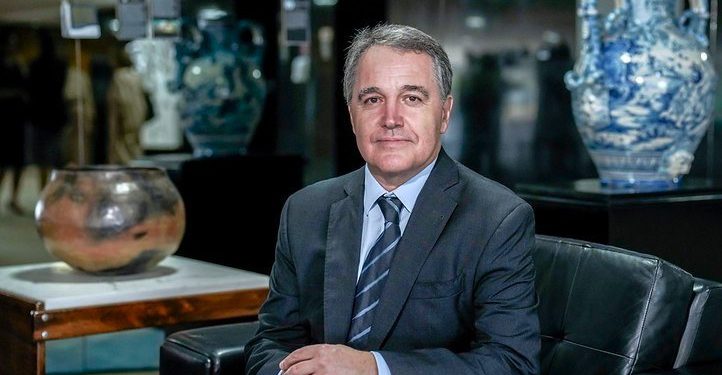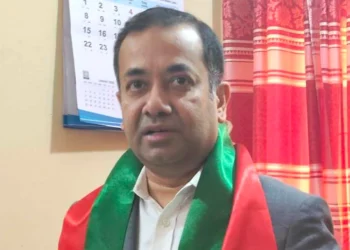In 2024, my hometown Porto Alegre in the South of Brazil, faced its worst flood in 80 years. Over 150 thousand people lost their homes, with an economic impact of nearly USD18 billion. This was not an isolated event. According to the World Meteorological Organization, more than 600 extreme weather events were reported last year alone.
These are clear signals of a system under strain. That’s why climate action is both deeply personal to me, and also vital to society as a whole.
In the 100 days since I became the COP30 Climate High-Level Champion, I’ve seen strong momentum across sectors. But momentum alone isn’t enough. We must urgently shift to delivery.
Ten years after the adoption of the Paris Agreement, and following the outcome of the first Global Stocktake – the UN’s “report card” on climate progress – the imperative is clear: we need fast, focused action that drives socioeconomic development, emissions reduction and resilience.
My experience working with diverse companies has shown me that we can adapt under pressure and innovate at scale. These first 100 days have reinforced that scaling solutions where they are most needed not only increases innovation, competitiveness, and green jobs, but also helps manage risk.
The good news is that we have the tools to implement the outcomes of the first Global Stocktake. And to my core, I believe we can.
To make this possible, the Climate High-Level Champions and the Marrakech Partnership have launched a work programme focused on aligning the climate action already underway across the systems we all rely on. This programme forms the operational backbone of the ambitious and integrated COP30 Climate Action Agenda.
The Action Agenda ensures that climate commitments can turn into measurable results. Think of it as shifting from promises to performance, powered by partnerships that span national and subnational governments, businesses, investors, and civil society.
This one integrated agenda is anchored on the Global Stocktake and is built around 30 key objectives aimed at accelerating change across six critical systems. These include transitioning energy, industry, and transport; protecting forests, oceans, and biodiversity; transforming agriculture and food systems; strengthening resilience in cities, infrastructure, and water; advancing human and social development; and unlocking enablers such as finance, technology, and capacity building.
This is not about creating new initiatives but supercharging what’s already working. To drive these objectives forward, the COP30 Presidency has appointed 30 special envoys who will work alongside activation groups — global task forces that bring together cities and regions, businesses and investors, Indigenous groups and civil society organizations. These teams will surface scalable solutions, and transparently track progress. This is a collective mobilization — a “mutirão,” as we call it in Brazil — where people work side by side to build something for the community bigger than themselves.
Momentum is already building. In 2024, global renewable energy investment hit USD2.1 trillion, nearly double the investment in fossil fuels, with private sector actors driving nearly half. Companies are investing capital and action through alliances like the Utilities for Net Zero Alliance (UNEZA), cutting emissions and costs.
Leadership from cities and regions, businesses, financiers, and civil society is also growing. More than 600 major businesses and financial institutions around the world are integrating nature into their business decisions through the Nature Positive for Climate Action call to action. Additionally, over 300 diverse food system actors are scaling sustainable, regenerative production approaches, through the Food Systems Call to Action.
The Race to Zero campaign now represents over 25% of global GDP, and is turning net zero pledges into implementation— with participating companies saving $13.6 billion in supply chain emissions reductions in 2023. In parallel, Race to Resilience is delivering tangible outcomes — boosting resilience for over 500 million vulnerable people through more than 2,000 cities and partner organizations.
COP30 must inaugurate a next decade of implementation. Brazil is ready to lead by example, offering scalable solutions that deliver both climate action and socioeconomic progress.
The Tropical Forest Forever Facility (TFFF) proposal, for instance, is an innovative mechanism to mobilize long-term, results-based financing of tropical forest conservation, a clear milestone in reshaping global climate finance from developing countries.
Originally introduced at COP28 in the United Arab Emirates in 2023, the TFFF aims to mobilize around USD 4 billion annually to be distributed among more than 70 countries.
Brazil is the fifth-largest biofuel producer globally, and its Ecological Transformation Plan targets further scale-up of ethanol and Sustainable Aviation Fuel (SAF) in the next few years. By setting clear targets, the country is well positioned to advance on the energy transition.
These examples show that COP30 is ready to shift from promises to real-world action.
Let’s choose change by design, not by disaster. Let’s keep the momentum alive and turn ambition into results that stand the test of time.




















